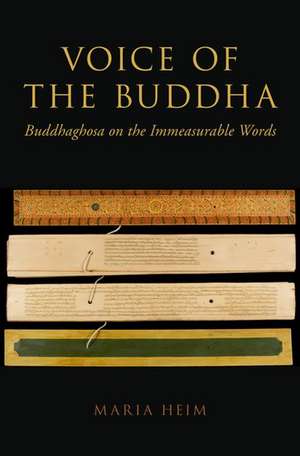Voice of the Buddha: Buddhaghosa on the Immeasurable Words
Autor Maria Heimen Limba Engleză Hardback – 8 noi 2018
Preț: 575.87 lei
Preț vechi: 782.74 lei
-26% Nou
Puncte Express: 864
Preț estimativ în valută:
110.19€ • 115.05$ • 91.20£
110.19€ • 115.05$ • 91.20£
Carte tipărită la comandă
Livrare economică 24-31 martie
Preluare comenzi: 021 569.72.76
Specificații
ISBN-13: 9780190906658
ISBN-10: 0190906650
Pagini: 288
Dimensiuni: 160 x 236 x 23 mm
Greutate: 0.57 kg
Editura: Oxford University Press
Colecția OUP USA
Locul publicării:New York, United States
ISBN-10: 0190906650
Pagini: 288
Dimensiuni: 160 x 236 x 23 mm
Greutate: 0.57 kg
Editura: Oxford University Press
Colecția OUP USA
Locul publicării:New York, United States
Recenzii
Heim's study demonstrates what scholars of Buddhism stand to gain by cultivating a (self-)critical and rigorously comparative philological method. Perhaps most strikingly, we gain access to a Pali Canon that most of us, reading through the peculiar lens of modern western epistemologies, have never encountered before.
If readers give Heim's study the careful attention it deserves, a compelling new approach to the study of Buddhist texts unfolds alongside the Buddha's omniscience. Indeed, Heim does for Buddhaghosa something similar to what Buddhaghosa does for the Buddha: by showing us how to read his words, she makes them act again in the present.
Heim does for Buddhaghosa something similar to what Buddhaghosa does for the Buddha: by showing us how to read his words, she makes them act again in the present
Heim's skillful writing makes the highly technical subject of commentarial studies very accessible and a pleasure to read.
Primary text Pali excerpts in the footnotes are useful for students and scholars of Pali. This book would be an excellent read for an advanced undergraduate or graduate seminar on Buddhism and its textual traditions. Heim's work is a significant contribution to the study of Buddhaghosa as well as ancient South Asian and early Buddhist Studies scholarship more broadly.
The broad contours and fine grain of Heim's book are equally admirable ... Heim's exquisite book would provide wonderful stimulation for ethical philosophers, scholars thinking about scriptural exegesis in other traditions, or those working on comparative reading practices
This study will be of much interest to advanced scholars of Buddhism
Voice of the Buddha is a superb book. There is no other work quite like it, and the discipline of Buddhist Studies needs more books of this sortat once philologically careful and philosophically astute.
Buddhaghosa is unparalleled among Buddhist commentators because he teaches not only what a text means but also how to read that text; Maria Heim is unparalleled among Buddhaghosa scholars because she teaches us not only what Buddhaghosa said, but also how to read Buddhaghosa. This beautiful study illuminates Buddhist commentarial practice and Buddhaghosa's contribution to that practice, and is an invaluable contribution to our understanding of Buddhist literature.
By reading over the shoulder of the great Theravada commentator Buddhaghosa, Maria Heim brings to light an ingenious and even astonishing understanding of the traditional Buddhist scriptural genres of Sutta, Vinaya, and Abhidhamma. This erudite and eloquent exposition of Buddhaghosa's profound and moving approach will appeal to all students of Buddhist scripture.
If readers give Heim's study the careful attention it deserves, a compelling new approach to the study of Buddhist texts unfolds alongside the Buddha's omniscience. Indeed, Heim does for Buddhaghosa something similar to what Buddhaghosa does for the Buddha: by showing us how to read his words, she makes them act again in the present.
Heim does for Buddhaghosa something similar to what Buddhaghosa does for the Buddha: by showing us how to read his words, she makes them act again in the present
Heim's skillful writing makes the highly technical subject of commentarial studies very accessible and a pleasure to read.
Primary text Pali excerpts in the footnotes are useful for students and scholars of Pali. This book would be an excellent read for an advanced undergraduate or graduate seminar on Buddhism and its textual traditions. Heim's work is a significant contribution to the study of Buddhaghosa as well as ancient South Asian and early Buddhist Studies scholarship more broadly.
The broad contours and fine grain of Heim's book are equally admirable ... Heim's exquisite book would provide wonderful stimulation for ethical philosophers, scholars thinking about scriptural exegesis in other traditions, or those working on comparative reading practices
This study will be of much interest to advanced scholars of Buddhism
Voice of the Buddha is a superb book. There is no other work quite like it, and the discipline of Buddhist Studies needs more books of this sortat once philologically careful and philosophically astute.
Buddhaghosa is unparalleled among Buddhist commentators because he teaches not only what a text means but also how to read that text; Maria Heim is unparalleled among Buddhaghosa scholars because she teaches us not only what Buddhaghosa said, but also how to read Buddhaghosa. This beautiful study illuminates Buddhist commentarial practice and Buddhaghosa's contribution to that practice, and is an invaluable contribution to our understanding of Buddhist literature.
By reading over the shoulder of the great Theravada commentator Buddhaghosa, Maria Heim brings to light an ingenious and even astonishing understanding of the traditional Buddhist scriptural genres of Sutta, Vinaya, and Abhidhamma. This erudite and eloquent exposition of Buddhaghosa's profound and moving approach will appeal to all students of Buddhist scripture.
Notă biografică
Maria Heim is Professor of Religion and Elizabeth W. Bruss Reader at Amherst College. She is the author of The Forerunner of All Things and Theories of the Gift in South Asia.
